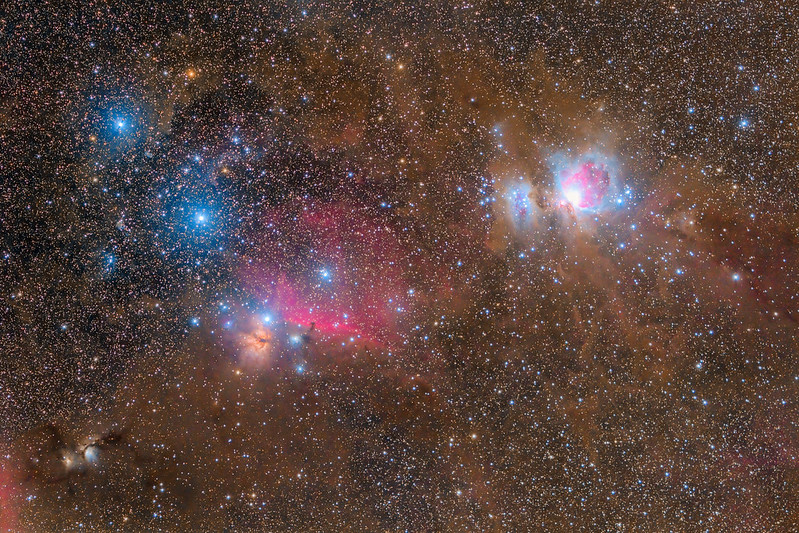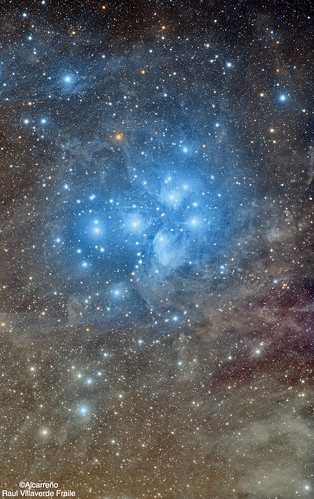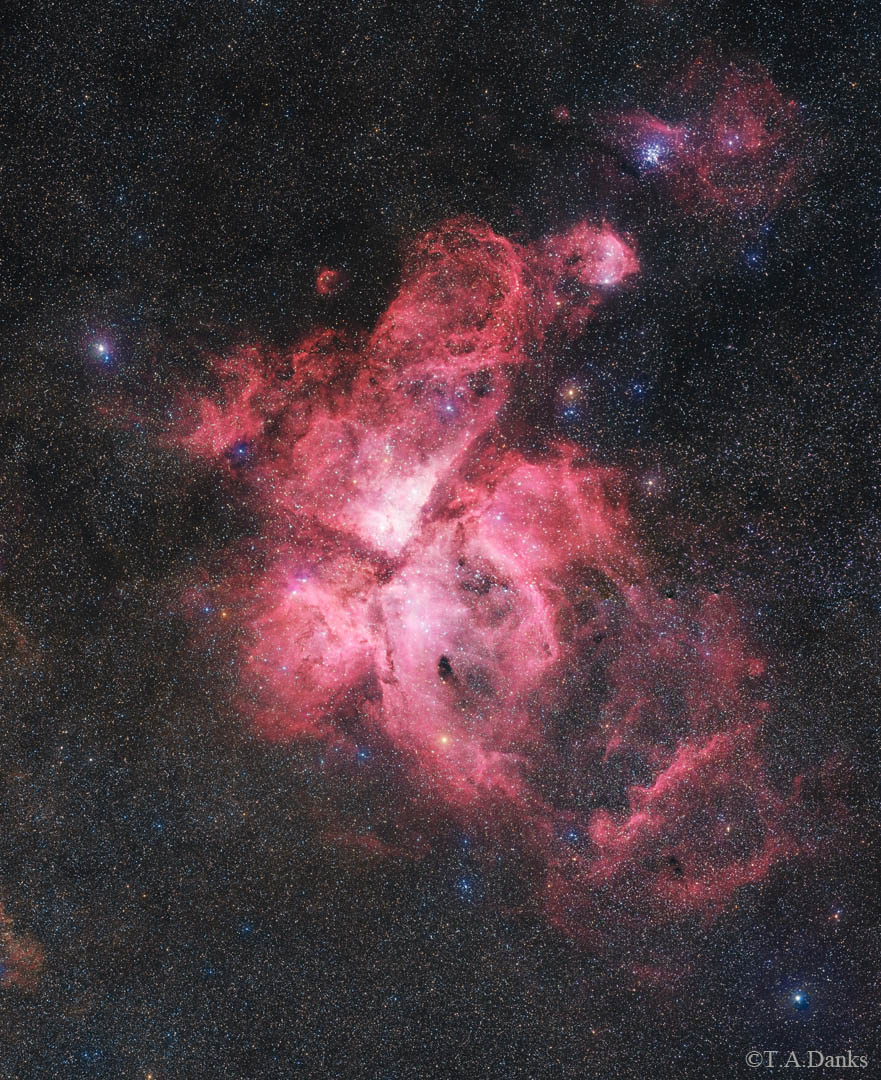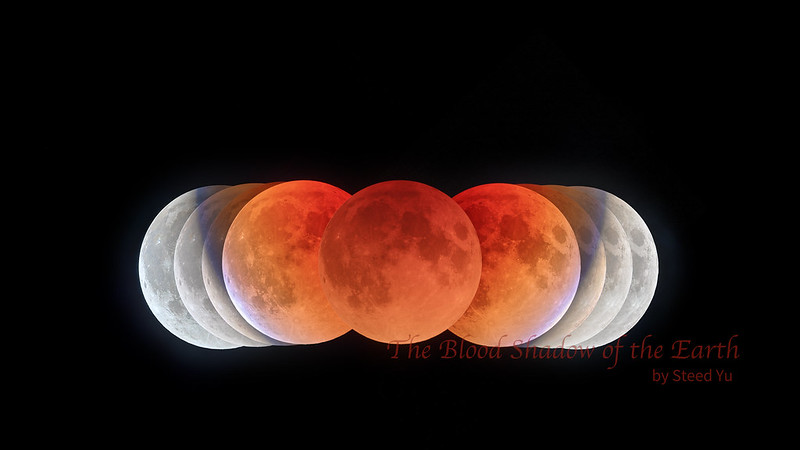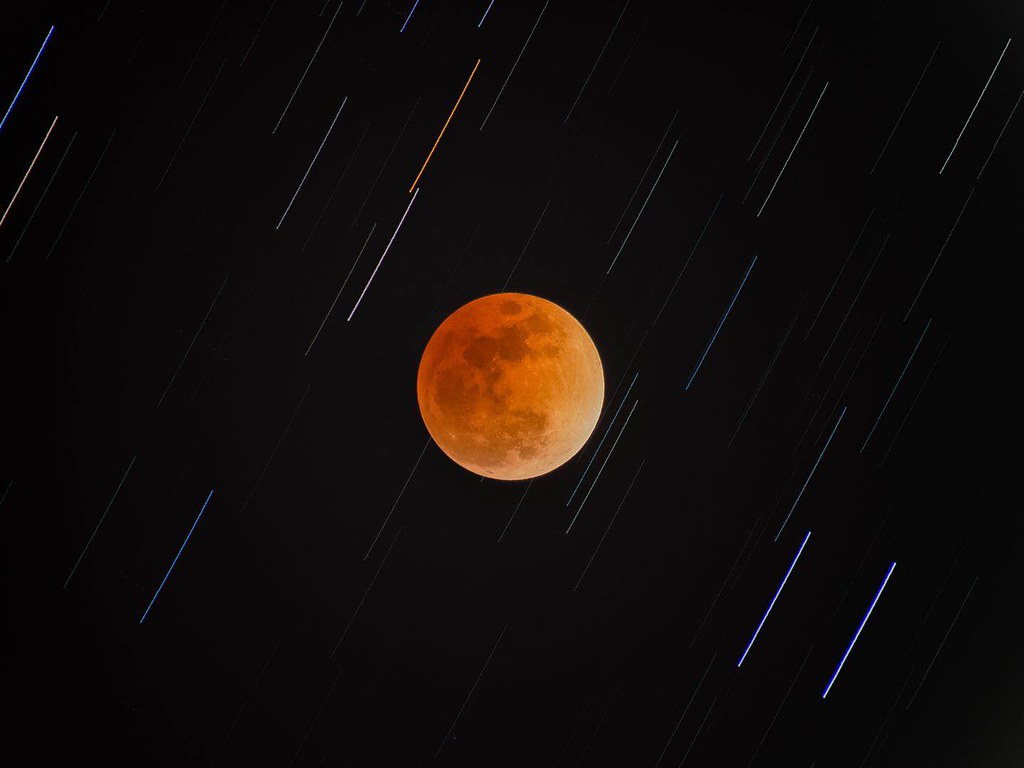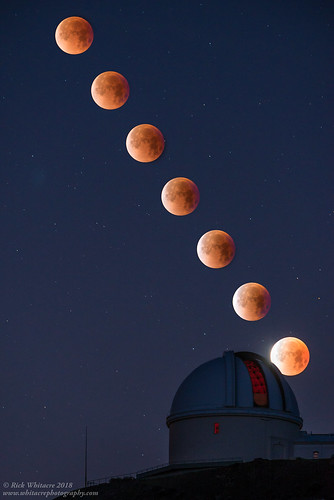Submissions: 2018 February
Submissions: 2018 February
__________________________________________________________________________________________________
Please post your images here.
Please see this thread before posting images; posting images demonstrates your agreement with
the possible uses for your image.
If hotlinking to an image, please ensure it is under 400K.
Hotlinks to images over 400K slow down the thread too much and will be disabled.
Thank you!
_________________________________________________________________________________________________
<- Previous submissions
[c]«« Discuss Anything in Astronomy «» Visit The Asterisk Main Page «» See Introductory Astonomy Lectures »»
«« Introduce Yourself «» Please Read the Rules »»[/c]
Please post your images here.
Please see this thread before posting images; posting images demonstrates your agreement with
the possible uses for your image.
If hotlinking to an image, please ensure it is under 400K.
Hotlinks to images over 400K slow down the thread too much and will be disabled.
Thank you!
_________________________________________________________________________________________________
<- Previous submissions
[c]«« Discuss Anything in Astronomy «» Visit The Asterisk Main Page «» See Introductory Astonomy Lectures »»
«« Introduce Yourself «» Please Read the Rules »»[/c]
Know the quiet place within your heart and touch the rainbow of possibility; be
alive to the gentle breeze of communication, and please stop being such a jerk. — Garrison Keillor
alive to the gentle breeze of communication, and please stop being such a jerk. — Garrison Keillor
Re: Submissions: 2018 February
Just want to share some old 2011 total lunar eclipse photos with others. 
Re: Submissions: 2018 February
comets
2" of fullmoon
2" of fullmoon
Last edited by Rothkko on Thu Feb 01, 2018 8:06 pm, edited 1 time in total.
-
Guest
Re: Submissions: 2018 February
Re: Submissions: 2018 February
The cone nebula in narrowband
Copyright: Juan Ignacio Jimenez
Copyright: Juan Ignacio Jimenez
Re: Submissions: 2018 February
"Balancing the Moon" photo by Mack H. Frost © 2018
The "blue blood super moon" of January 31, 2018, as it sets behind Heart Mountain, near Cody. Wyoming, USA.
A snowstorm the previous evening cleared in the pre-dawn hours and we were able to see the eclipse from the beginning until it set.
Canon 80-D, EF100-400mm f/4.5-5.6L IS USM lens set to 400mm; 3.2 s at f/5.6, ISO 100; 7:03 AM MST
The "blue blood super moon" of January 31, 2018, as it sets behind Heart Mountain, near Cody. Wyoming, USA.
A snowstorm the previous evening cleared in the pre-dawn hours and we were able to see the eclipse from the beginning until it set.
Canon 80-D, EF100-400mm f/4.5-5.6L IS USM lens set to 400mm; 3.2 s at f/5.6, ISO 100; 7:03 AM MST
-
Martin Bernier
- Ensign
- Posts: 13
- Joined: Wed Apr 11, 2012 6:39 am
- Location: St-Liboire, Québec
Re: Submissions: 2018 February
A horse and a flame
Copyright: Martin Bernier
http://www.astrosurf.com/astrobernier more resolution http://www.astrosurf.com/astrobernier/i ... _jan18.jpg
Here is a mosaic of two pictures (not quite in the same angle) Made this winter at my home in St -Liboire, Quebec.
Setup: AT12IN f4 on EQ8. QSI683wsg. Autoguiding. ASI120mm on optical splitter. With PHD2. Astrodon filters. LRGB Left Part = 70-30-30-30 minutes. Right part LHaRGB = 120-120-30-30-30 minutes. CCDSoft, PS CS6.
Good viewing
Martin
Copyright: Martin Bernier
http://www.astrosurf.com/astrobernier more resolution http://www.astrosurf.com/astrobernier/i ... _jan18.jpg
Here is a mosaic of two pictures (not quite in the same angle) Made this winter at my home in St -Liboire, Quebec.
Setup: AT12IN f4 on EQ8. QSI683wsg. Autoguiding. ASI120mm on optical splitter. With PHD2. Astrodon filters. LRGB Left Part = 70-30-30-30 minutes. Right part LHaRGB = 120-120-30-30-30 minutes. CCDSoft, PS CS6.
Good viewing
Martin
Re: Submissions: 2018 February
Total Lunar Eclipse of 31 January 2018 (the super blue blood moon) rising over Wat Maha That, a Buddhist temple in the Historical Park of Ayutthaya, central Thailand.

This 330-image composite was taken for slightly more than 3 hours, with 5-minute gap during totality.
The reflection of the eclipsed moon can be seen in the water. Star trails of the winter constellations (Orion and his dogs, Gemini and Auriga) and random paths of airplane were also visible in the sky.
Copyright: HuiChieh (mydarksky.org)
Higher resolution link: https://www.flickr.com/photos/mydarksky ... 187782598/

This 330-image composite was taken for slightly more than 3 hours, with 5-minute gap during totality.
The reflection of the eclipsed moon can be seen in the water. Star trails of the winter constellations (Orion and his dogs, Gemini and Auriga) and random paths of airplane were also visible in the sky.
Copyright: HuiChieh (mydarksky.org)
Higher resolution link: https://www.flickr.com/photos/mydarksky ... 187782598/
Re: Submissions: 2018 February
The Blood Moon with the Beehive Cluster
Copyright: Steed Yu
 The Blood Moon with the Beehive Cluster by 虞 骏, on Flickr
The Blood Moon with the Beehive Cluster by 虞 骏, on Flickr
Copyright: Steed Yu
 The Blood Moon with the Beehive Cluster by 虞 骏, on Flickr
The Blood Moon with the Beehive Cluster by 虞 骏, on FlickrRe: Submissions: 2018 February
Title: Two eclipses in one day!
Less than 24 hours after the so called "blue super blood moon" (or is it "super blue blood moon"???), I had the chance to witness another "eclipse" of the Moon, but very much partial this time. Indeed, the ISS was transiting the Moon, covering ~0.03% of its surface (assuming my math is correct) for just over half a second. Since it seems to be necessary to come up with a name for everything, I suggest will call this the tie fighter-dotted moon...
Technical details: 19 frames showing the ISS extracted from a video recorded with an ASI120 camera on a 80mm refracting telescope. The frames were then stitched with two other frames taken minutes before the transit to get the whole Moon (which does not fit on the sensor of the camera in one shot at 480mm focal length).
Transit happened at 23h59m38s (MST) on January 31st. Images taken from the side of Bush Highway, a few miles East of Phoenix (Arizona).
I also had a setup with a camera on a bigger telescope, it failed to record the transit because it happened 2 seconds after the time predicted by calsky. It made my blood boil to not see the ISS at the exact time predicted, but I'm trying to not get too much the blues about the missed super-resolution images...
Copyright: Jean-Francois Gout
Link to the full resolution image: https://photos.smugmug.com/Astronomy-Mi ... opi_cr.jpg
jf
Less than 24 hours after the so called "blue super blood moon" (or is it "super blue blood moon"???), I had the chance to witness another "eclipse" of the Moon, but very much partial this time. Indeed, the ISS was transiting the Moon, covering ~0.03% of its surface (assuming my math is correct) for just over half a second. Since it seems to be necessary to come up with a name for everything, I suggest will call this the tie fighter-dotted moon...
Technical details: 19 frames showing the ISS extracted from a video recorded with an ASI120 camera on a 80mm refracting telescope. The frames were then stitched with two other frames taken minutes before the transit to get the whole Moon (which does not fit on the sensor of the camera in one shot at 480mm focal length).
Transit happened at 23h59m38s (MST) on January 31st. Images taken from the side of Bush Highway, a few miles East of Phoenix (Arizona).
I also had a setup with a camera on a bigger telescope, it failed to record the transit because it happened 2 seconds after the time predicted by calsky. It made my blood boil to not see the ISS at the exact time predicted, but I'm trying to not get too much the blues about the missed super-resolution images...
Copyright: Jean-Francois Gout
Link to the full resolution image: https://photos.smugmug.com/Astronomy-Mi ... opi_cr.jpg
jf
Re: Submissions: 2018 February
Lunar halo over Paranal Observatory
Copyright: Juan Carlos Munoz-Mateos
Clouds are astronomers’ worst enemies, but they’re really photogenic. I captured this glorious lunar halo a couple of days ago at Paranal Observatory. Halos around the Sun or the Moon are caused by tiny ice crystals in cirrus at high altitude, which refract the light at an angle of 22 degrees. More precisely, light of different colours is refracted at slightly different angles, which is why you can see a circular rainbow along the inner rim of the halo. In this family portrait of Paranal you can see the four 8 m Unit Telescopes, the four smaller Auxiliary Telescopes, and the VST telescope in the background. The UT4 telescope is shooting it’s mighty 22 watts lasers, as part of a technical test to characterise a new adaptive optics module to correct the atmospheric turbulence. Canon 6D + Rokinon 14 mm at f/4, 30 secs, ISO200.
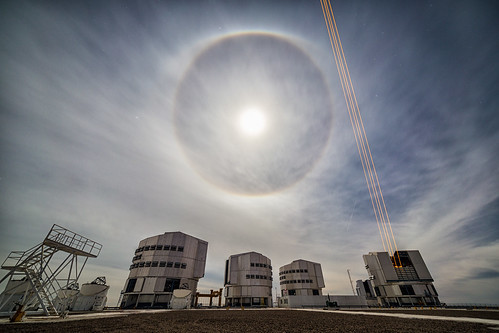 Lunar halo over Paranal Observatory by Juan-Carlos Munoz-Mateos, on Flickr
Lunar halo over Paranal Observatory by Juan-Carlos Munoz-Mateos, on Flickr
Copyright: Juan Carlos Munoz-Mateos
Clouds are astronomers’ worst enemies, but they’re really photogenic. I captured this glorious lunar halo a couple of days ago at Paranal Observatory. Halos around the Sun or the Moon are caused by tiny ice crystals in cirrus at high altitude, which refract the light at an angle of 22 degrees. More precisely, light of different colours is refracted at slightly different angles, which is why you can see a circular rainbow along the inner rim of the halo. In this family portrait of Paranal you can see the four 8 m Unit Telescopes, the four smaller Auxiliary Telescopes, and the VST telescope in the background. The UT4 telescope is shooting it’s mighty 22 watts lasers, as part of a technical test to characterise a new adaptive optics module to correct the atmospheric turbulence. Canon 6D + Rokinon 14 mm at f/4, 30 secs, ISO200.
 Lunar halo over Paranal Observatory by Juan-Carlos Munoz-Mateos, on Flickr
Lunar halo over Paranal Observatory by Juan-Carlos Munoz-Mateos, on Flickr-
Thierry Legault
- Ensign
- Posts: 85
- Joined: Wed May 26, 2010 4:45 pm
Re: Submissions: 2018 February
The total (super)moon eclipse of Jan 31 over Singapore!
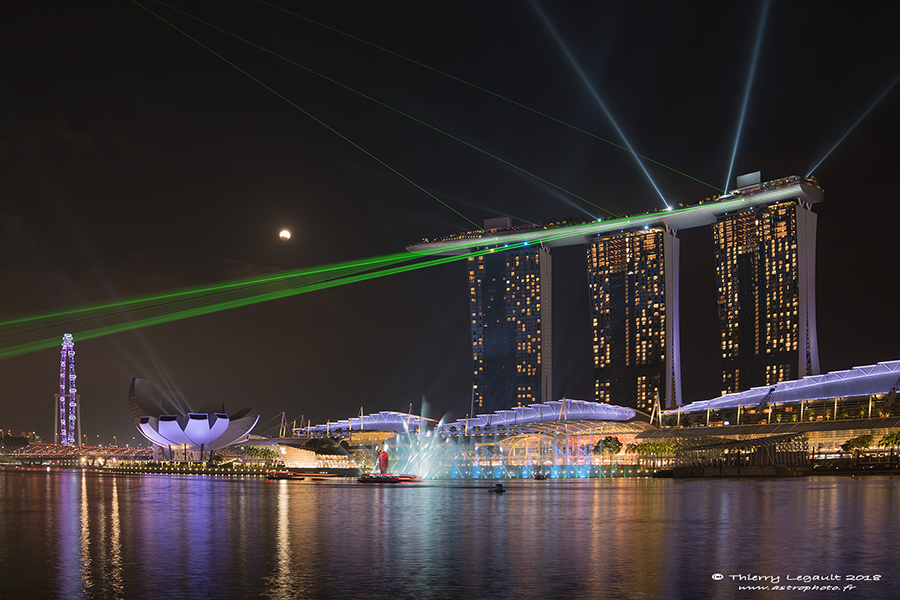
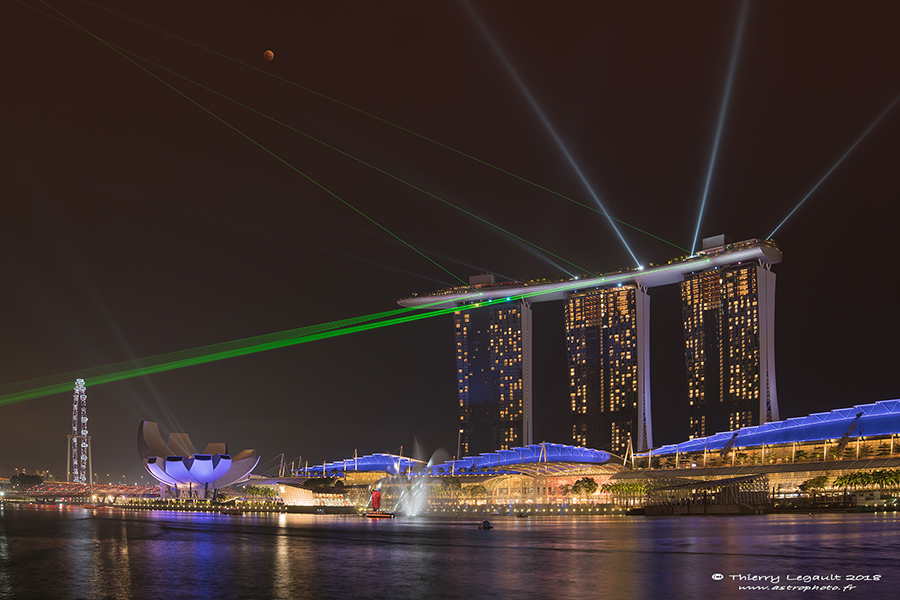
From left to right: The Singapore Flyer, the Art&Science Museum and the Marina Bay Sands hotel during the laser show.
Higher resolution images:
partial: http://www.astrophoto.fr/eclipse180131_ ... ore_fb.jpg
total: http://www.astrophoto.fr/eclipse180131_ ... ore_fb.jpg


From left to right: The Singapore Flyer, the Art&Science Museum and the Marina Bay Sands hotel during the laser show.
Higher resolution images:
partial: http://www.astrophoto.fr/eclipse180131_ ... ore_fb.jpg
total: http://www.astrophoto.fr/eclipse180131_ ... ore_fb.jpg
-
Steve Pastor
- Ensign
- Posts: 26
- Joined: Mon Jun 20, 2016 5:20 pm
Re: Submissions: 2018 February
The Planetary Nebula Messier 27 with O[III] Envelope
The planetary nebula Messier 27 is found in the constellation Vulpecula, which was discovered in 1764 by Charles Messier. The nebula is approximately 815 light-years away. The outer Oxygen envelope was captured using an O[III] filter. The image is a total of 12 hr exposure taken through three different telescopes: 12.5 inch f/9 RCOS astrograph with a SBIG STF8300c CCD camera (Paramount ME); Astro-Physics 178 f/9 with a SBIG STF8300c CCD camera (Astro-Physics 1200); and a Takahashi CCA-250 f/5 with an QSI683wsg CCD camera (Astrodon 3nm O[III] filter) on the nights of 14, 15, 16, 17 Sept 2015; 15 June 2016; 16, 17, 23 Oct 2017 in Mayhill, NM (13 x 1200 sec Lights at -20 deg C; 24 Darks, 128 Bias; 128 flats). Calibrated, Registered, Integrated, and Processed in PixInsight 1.8.5.1353 Ripley (x64).
For a larger version, see: http://astronomersgroup.org/gallery/dis ... fullsize=1
The planetary nebula Messier 27 is found in the constellation Vulpecula, which was discovered in 1764 by Charles Messier. The nebula is approximately 815 light-years away. The outer Oxygen envelope was captured using an O[III] filter. The image is a total of 12 hr exposure taken through three different telescopes: 12.5 inch f/9 RCOS astrograph with a SBIG STF8300c CCD camera (Paramount ME); Astro-Physics 178 f/9 with a SBIG STF8300c CCD camera (Astro-Physics 1200); and a Takahashi CCA-250 f/5 with an QSI683wsg CCD camera (Astrodon 3nm O[III] filter) on the nights of 14, 15, 16, 17 Sept 2015; 15 June 2016; 16, 17, 23 Oct 2017 in Mayhill, NM (13 x 1200 sec Lights at -20 deg C; 24 Darks, 128 Bias; 128 flats). Calibrated, Registered, Integrated, and Processed in PixInsight 1.8.5.1353 Ripley (x64).
For a larger version, see: http://astronomersgroup.org/gallery/dis ... fullsize=1
Re: Submissions: 2018 February
Re: Messier 45
That is just a splendid picture!alcarreño wrote:Copyright: Raul Villaverde Fraile
https://farm5.staticflickr.com/4603/282 ... 78c526.jpg
Las pleyades 2018 mosaico de 3v2 by Raul Villaverde, en Flickr
Ann
Color Commentator
Re: Messier 45
Thanks¡¡Ann wrote:That is just a splendid picture!alcarreño wrote:Copyright: Raul Villaverde Fraile
https://farm5.staticflickr.com/4603/282 ... 78c526.jpg
Las pleyades 2018 mosaico de 3v2 by Raul Villaverde, en Flickr
Ann
Re: Submissions: 2018 February
2018 Total Lunar Eclipse Over Melbourne
Copyright: Steve Johnston Multiple exposures taken over 4+ hours using a Canon 5D MkII and 28mm f/2.8 lens, ISO 400, f/5.6 with exposures ranging from 1/4000 second for full moon to 2 seconds at totality.
Taken from Murrumbeena Reserve, Melbourne, Australia on 31 January and 1 February 2018.
Technically, it wasn't a blue moon for the most eastern states in Australia because the full moon occurred at 12.26 am (AEST) on 1 February due to daylight savings.
Copyright: Steve Johnston Multiple exposures taken over 4+ hours using a Canon 5D MkII and 28mm f/2.8 lens, ISO 400, f/5.6 with exposures ranging from 1/4000 second for full moon to 2 seconds at totality.
Taken from Murrumbeena Reserve, Melbourne, Australia on 31 January and 1 February 2018.
Technically, it wasn't a blue moon for the most eastern states in Australia because the full moon occurred at 12.26 am (AEST) on 1 February due to daylight savings.
Re: Submissions: 2018 February
M42 and surrounding nebulas
Copyright: Pedro Santos
https://www.flickr.com/photos/23636605@N02/26120948008/ Is taken from a small village with the name Silva Escura in Portugal.
In the image is possible to see many nebulas.
In the top a little to the right appear the open cluster NGC 1981 and more to the right VDB44
Just below the open cluster is the running man nebula NGC1977 , and below M43 ,and next to it
M42 the orion nebula, and more to the right VDB 42.
Below M42 is IC428 ,and IC427 . At the bottom NGC 1999 .
Higher resolution link:https://www.flickr.com/photos/23636605@ ... 8/sizes/o/
Best regards
Pedro Santos
Copyright: Pedro Santos
https://www.flickr.com/photos/23636605@N02/26120948008/ Is taken from a small village with the name Silva Escura in Portugal.
In the image is possible to see many nebulas.
In the top a little to the right appear the open cluster NGC 1981 and more to the right VDB44
Just below the open cluster is the running man nebula NGC1977 , and below M43 ,and next to it
M42 the orion nebula, and more to the right VDB 42.
Below M42 is IC428 ,and IC427 . At the bottom NGC 1999 .
Higher resolution link:https://www.flickr.com/photos/23636605@ ... 8/sizes/o/
Best regards
Pedro Santos
Last edited by bystander on Sat Feb 03, 2018 5:26 pm, edited 2 times in total.
Reason: <img> tags require image urls, not page urls
Reason: <img> tags require image urls, not page urls
-
checkmates
- Asternaut
- Posts: 5
- Joined: Sat Aug 05, 2017 3:47 am
Re: Submissions: 2018 February
Lunar Eclipse
The Maximus Phrase of total lunar eclipse, stack with 110 pics
The Maximus Phrase of total lunar eclipse, stack with 110 pics
Re: Submissions: 2018 February
GIF of ISS and Super Blue Moon
https://www.astrobin.com/332024/D/?nc=user
Copyright: Daniel Goelling Please note the .gif is slowed down by 4x. The actual time the ISS was in front of the lunar disk was only 0.59 seconds.
Best,
Dan
https://www.astrobin.com/332024/D/?nc=user
Copyright: Daniel Goelling Please note the .gif is slowed down by 4x. The actual time the ISS was in front of the lunar disk was only 0.59 seconds.
Best,
Dan
-
Guest
Re: Submissions: 2018 February

The evolution of the lunar eclipse on January 31 above the mountains in Vestvågøya and Flakstadøya, Lofoten Islands. The panorama also shows how the surrounding light changed during the eclipse.
The pano was assembled from multiple shots taken through a Pentax 75SDHF telescope.
Alex Conu, TWAN
